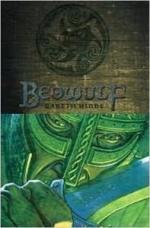[1] For the ‘Þaet’ of verse 15, Sievers suggests ‘Þa’ (= which). If this be accepted, the sentence ‘He had ... afflicted’ will read: He (i.e. God) had perceived the malice-caused sorrow which they, lordless, had formerly long endured.
[2] For ‘aldor-lease’
(15) Gr. suggested ‘aldor-ceare’:
He perceived
their distress, that they
formerly had suffered life-sorrow a long
while.
[3] A very difficult passage. ‘Ahte’ (31) has no object. H. supplies ‘geweald’ from the context; and our translation is based upon this assumption, though it is far from satisfactory. Kl. suggests ‘laendagas’ for ‘lange’: And the beloved land-prince enjoyed (had) his transitory days (i.e. lived). B. suggests a dislocation; but this is a dangerous doctrine, pushed rather far by that eminent scholar.
[4] The reading of the H.-So. text has been quite closely followed; but some eminent scholars read ‘sele-raedenne’ for ‘sele-raedende.’ If that be adopted, the passage will read: Men cannot tell us, indeed, the order of Fate, etc. ‘Sele-raedende’ has two things to support it: (1) v. 1347; (2) it affords a parallel to ‘men’ in v. 50.
II.
SCYLD’S SUCCESSORS.—HROTHGAR’S GREAT MEAD-HALL.
{Beowulf succeeds his father Scyld}
In
the boroughs then Beowulf, bairn of the Scyldings,
Beloved
land-prince, for long-lasting season
Was
famed mid the folk (his father departed,
The
prince from his dwelling), till afterward sprang
5
Great-minded Healfdene; the Danes in his lifetime
He
graciously governed, grim-mooded, aged.
{Healfdene’s birth.}
Four
bairns of his body born in succession
Woke
in the world, war-troopers’ leader
Heorogar,
Hrothgar, and Halga the good;
10 Heard
I that Elan was Ongentheow’s consort,
{He has three sons—one of them, Hrothgar—and a daughter named Elan. Hrothgar becomes a mighty king.}
The
well-beloved bedmate of the War-Scylfing leader.
Then
glory in battle to Hrothgar was given,
Waxing
of war-fame, that willingly kinsmen
Obeyed
his bidding, till the boys grew to manhood,
15 A numerous
band. It burned in his spirit
To
urge his folk to found a great building,
A
mead-hall grander than men of the era
{He is eager to build a great hall in which he may feast his retainers}
Ever
had heard of, and in it to share
With
young and old all of the blessings
20 The Lord
had allowed him, save life and retainers.
Then
the work I find afar was assigned
[4] To many races in middle-earth’s regions,
To
adorn the great folk-hall. In due time it happened
Early
’mong men, that ’twas finished entirely,
25 The greatest
of hall-buildings; Heorot he named it




